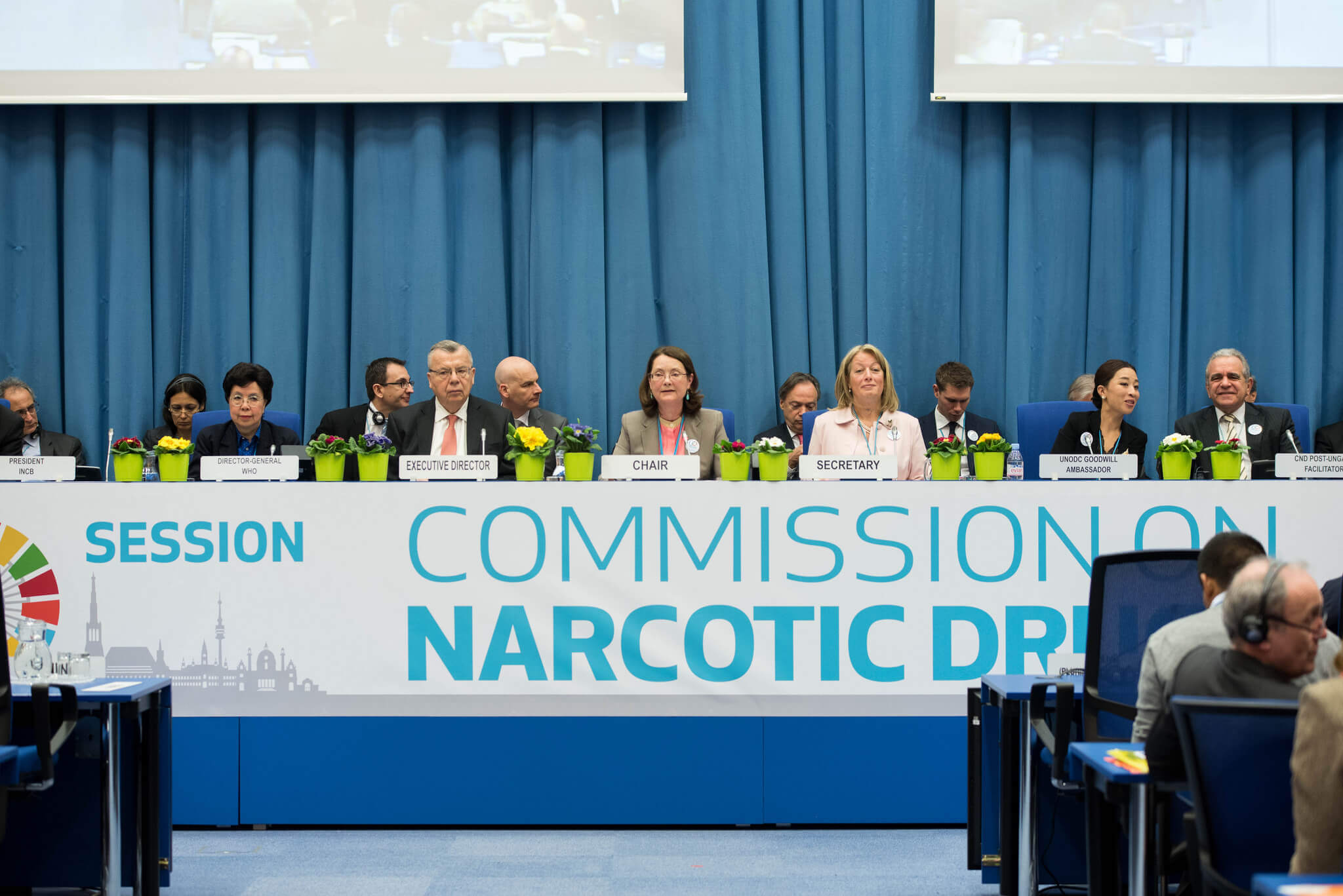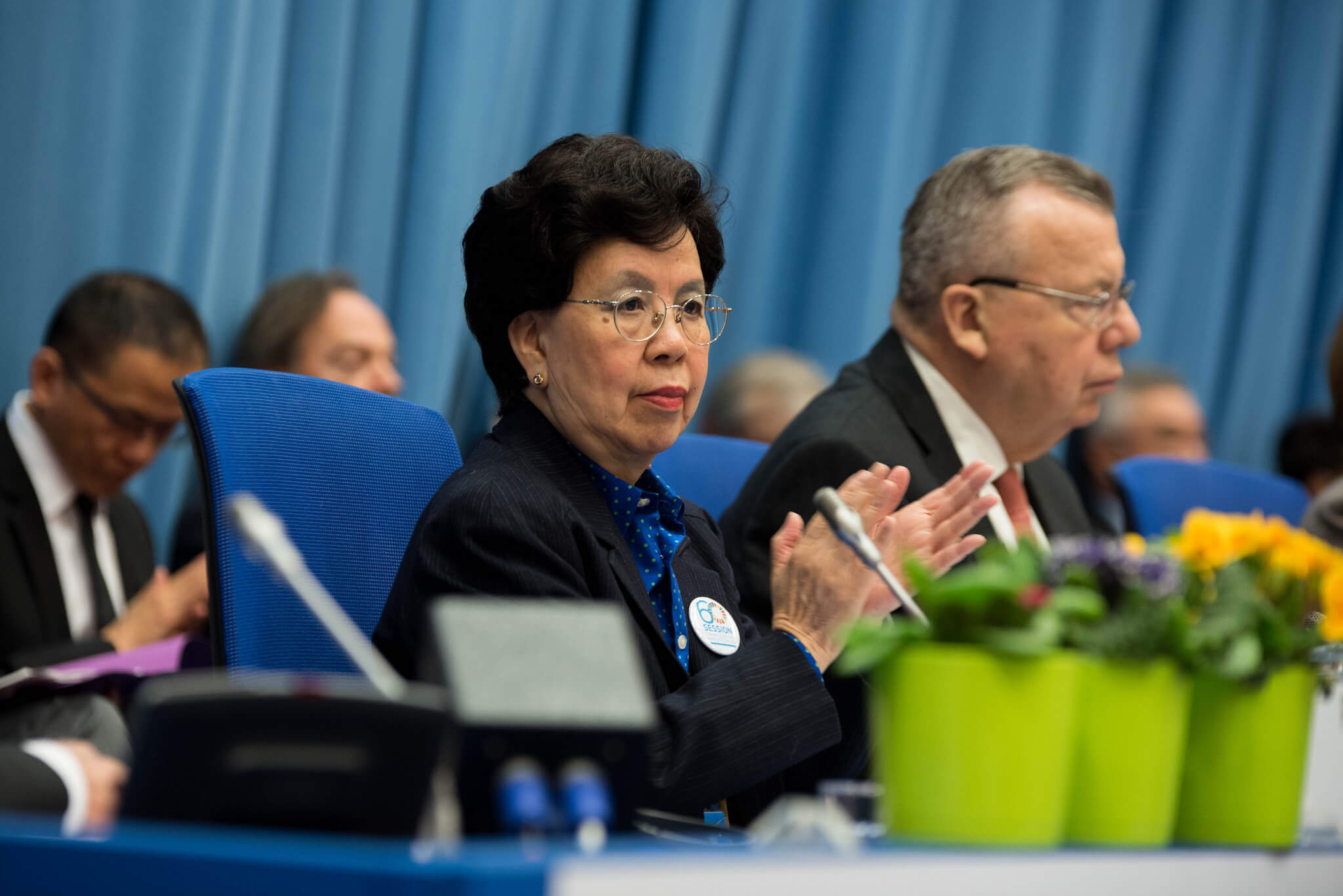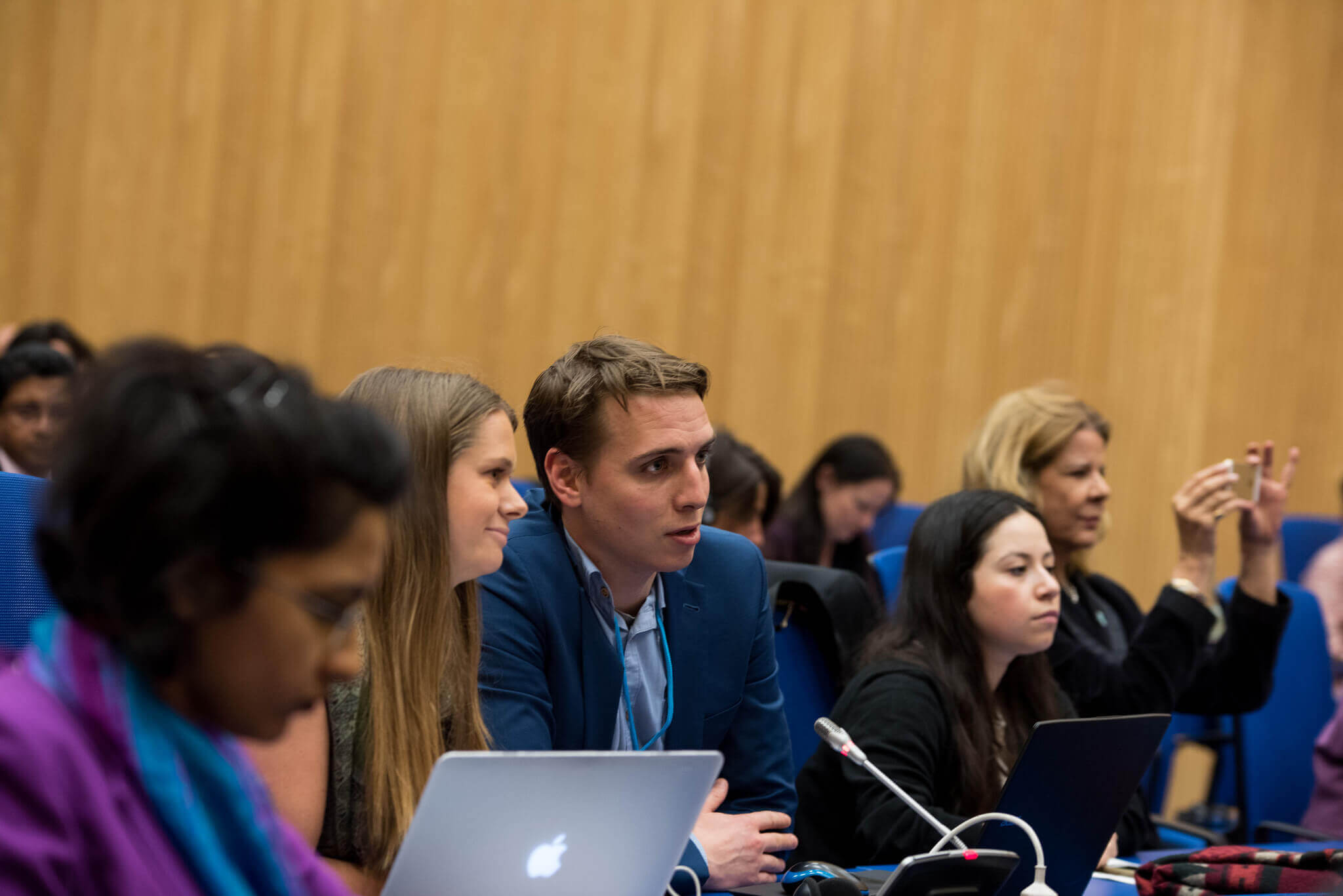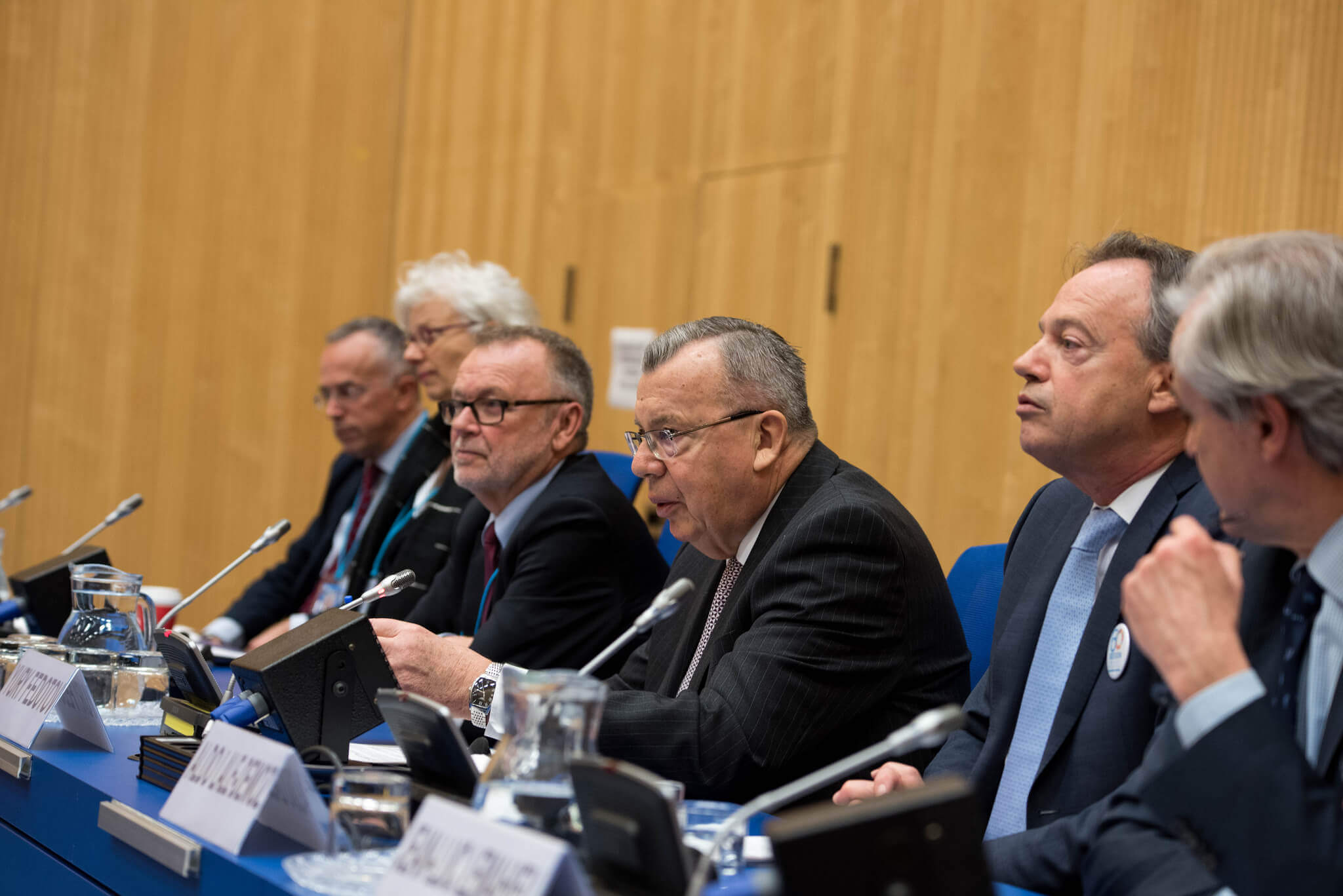The lights are dimming down. We almost feel like we are at the cinema. Large screens timidly present slides of black-and-white photos. The background music would work well for a fancy fountain pen’s ad, or one for a luxurious brand of pralines: serene and dignified.
One of the first slides shows Harry Anslinger, the founder of the Federal Bureau of Narcotics in the U.S. and the U.S. Representative to the United Nations Narcotics Commission. However, the slide doesn’t show he was a devoted racist who couldn’t decide between despising black Americans or Asians more. The biggest achievement of his life? He successfully lobbied for global drug prohibition. On the slideshow, he is depicted as a hero.
More photos. It’s 1961. Single Convention on Narcotic Drugs is signed. Cannabis joins other controlled substances (opium, cocaine, heroin, morphine, and a few others). Great success! Ten years later, in 1971, the UN Convention on Psychotropic Substances is signed. Psychedelics (MDMA, LSD, DMT, psilocybin, etc.) get scheduled, meaning that from now on their use will be strictly controlled. Another triumph for prohibitionists! The next slide shows a gathering of officials in the ‘70s. They have signed a third treaty, the Convention on Psychotropic Substances, which means that what was already in place is only reinforced further: the list of scheduled substances grow, while the expressions of guys in suits in the photos look more and more excited with each screened photo.
More photos, more happy faces, more dates. The last ones’ date from the 2009 Political Declaration, where the drug-free world phantasy was reiterated, and from the UNGASS 2016 (United Nations General Assembly Special Session On the World Drug Problem) in New York.
Serene and dignified music eases off, the lights are back on. People at the plenary session clap their hands – as if there was anything to applaud. In the UN’s Vienna International Centre, the 60th Session of the Commission on Narcotic Drugs is about to begin. Everyone involved with drugs at the international level is here, from Saudi Arabian diplomats to psychedelic enthusiasts from the Czech Republic.
Diamond Jubilee
The Commission on Narcotic Drugs (CND) came to life in 1946, shortly after the United Nations was established. Since then its main goal has pretty much remained the same: it makes international law and ensures it is obeyed by member states.
Sorry, the war on drugs didn’t end in Vienna this time.
This year’s CND session started on March 13th and lasted for a week. It was the sixtieth time that hundreds of delegates filled the plenary session to discuss drugs. The head of the UNODC, Yury Fedotov fell in love with the phrase “diamond jubilee” and used it repeatedly throughout the week. He spoke also about UN successes, albeit a bit too vaguely, so we were unable to know to what he was actually referring. More to the point, everything followed the same, well-known scenario from previous years: sorry, the war on drugs didn’t end in Vienna this time.
Rhetorical tricks were mixed with genuine declarations and blatant lies while opening statements were given by official delegates. Listening to these couple of dozens of delegates is a truly peculiar experience; even the most die-hard supporters of the murderous war on drugs, like the Philippines, approach the podium to assure everyone on their fierce commitment to protecting human rights, peace, and order.
It’s better to have your bullshit detector perfectly adjusted when being exposed to that.
The Philippines, where President Rodrigo Duterte openly supports extrajudicial killings of drug users, is an extreme example of a “drug-free world” policy. On the other hand, there is Canada or Uruguay, which are working on legalising pot for recreational smokers. But where do Central and East European countries stand in this peculiar environment? I listened to the official statements of their governmental representatives and asked members of civil society for comments.

The European Union of harm reduction
There were more than 50 speakers giving their statements at the opening of the 60th Session of the Commission on Narcotic Drugs. It took them more than a day to actually open the session. However, there weren’t many active representatives from Central and Eastern Europe; most decided that the European Union can speak on their behalf at the UN meeting in Vienna. We didn’t listen to Estonian, Lithuanian, or Latvian speakers. Czech Republic, Hungary, and Poland also stated their full support for the EU position, but they chose to give speeches at the plenary session, underlining the most pressing issues connected with drugs.
So, what is this European Union statement, to which all the member states refer? It is built upon a framework of harm reduction. In the simplest terms, the EU is focused on reducing harms caused by drug consumption, rather than on fighting drugs as the embodiment of some eternal evil. “EU drug strategy foresees that alternatives to coercive sanctions should be provided, and in fact, all EU member states provide treatment for drug use as part of at least one alternative to coercive sanctions,” said a Maltese representative, who spoke on behalf of the whole European Union.
Czech Republic: as progressive as it could be
The experience of drug users, clients of drug-related services, and their families should be taken account in our future discussion.
The Czech Republic, who introduced a statewide decriminalisation of drugs in 2009, started their speech as most of the EU member states did, by assuring everyone at the plenary session of their full support for the European Union’s position. The Czech representative called for “respect for fundamental freedoms and human rights, human dignity, liberty, democracy, equality, solidarity, rule of law, and the right to health.” He did not limit himself to dropping big words. “[We] call on states using the death penalty to adopt a moratorium as a first step towards abolition,” said the head of the Czech delegation. He also emphasised the role of drug users in the global discussion on drug policies, “Contribution of civil society at all levels should be recognised, fully acknowledged, and encouraged. The experience of drug users, clients of drug-related services, and their families should be taken account in our future discussion.”

We asked Eva Césarová, co-founder of the Czech Psychedelic Society and communication officer at YOUTH Rise, what she makes of the diplomatic speech given by the Czech representatives. “I would say that the statement is as progressive as the ‘high-level diplomacy’ allows, and maybe even more than that,” says Césarová. She points out that it’s not a surprise to her and to anyone who follows the international debate on drugs. The Czech Republic is considered to be on the forefront of the progressive countries in Europe. But does it mean that there are no problems connected with drugs in the Czech Republic? “Well, limited knowledge about their safe use is certainly a problem,” answers Césarová. “It’s almost impossible to test drugs, except with the tests you can buy online. There are a lot of music parties and festivals where people experiment with altered states of consciousness, but you won’t see many harm reduction services at these gigs,” she points out. Césarová is a bit sceptical about CND as a body that will advance such progressive ideas as drug-checking initiatives. “It is hard to bring these questions up on the CND table where you have to debate with governments who kill their people for using drugs.”
Drug-free lifestyle in Hungary
Harm reduction is a taboo for this government, important programs have been shut down, including the two largest needle and syringe programs.
There are not many similarities between the Czech and Hungarian statement. They sound like they were coming from two different universes, even though it’s just a few hundred kilometres between the two countries. The Hungarian government is not as interested in harm reduction services as it is in a “community-based approach focusing on a drug-free lifestyle.” “We promote prevention, treatment and reintegration. We reiterate a role for the families and local communities,” stated the representative of the Hungarian government. In Hungary, drugs seem to be the concern of criminal justice system not health care specialists. “On supply reduction, we focus on law enforcement, to effectively respond to challenges in the criminal field,” said the Hungarian official. “We all have to commit to devoting ourselves to future progress to effectively counter the world drug problem.”
Peter Sarosi is a true veteran of Commission on Narcotic Drugs sessions. It was his fourteenth time in Vienna this year. He is a Hungarian journalist running the website Drugreporter and a chair of the Rights Reporter Foundation. We reached out to him for a comment. “I think the quality of this statement is very low, it has no other message than that Hungary is complying with the drug control system,” Sarosi points out. “It is not surprising that the statement mentions ‘drug-free lifestyle’ and law enforcement but not harm reduction. Harm reduction is a taboo for this government, important programs have been shut down, including the two largest needle and syringe programs.” As the Czech members of civil society get used to being generally satisfied with the official statement of their government, Sarosi seems to be disillusioned that the current political elite in Hungary can change their conservative stance on drugs. “The drug coordination in the Ministry of Human Resources is very weak, only a few people work on it and they do not have a lobbying power within the government administration, their background institutions were abolished in recent years (including the National Drug Prevention Institute),” he underlines.

Poland: bad law, good statement
The Polish government is usually, and accurately, portrayed in the media as the one following the footsteps of crawling authoritarianism of Viktor Orban. But it’s not the case when it comes to drug policy.
Poland does have one of the harshest laws in Europe regarding drugs, it’s true. The law passed in 2000 criminalised possession of all drugs, even a tiny amount of them. However, since 2011, a legal mechanism has been introduced that allows judges to stop prosecution for those accused of drug possession (i.e. a small amount for private use) because of the minor social danger of the offence. And the National Bureau for Drug Prevention, the most important agency covering drug policy, openly supports harm reduction initiatives.
We particularly wish to emphasise our general objection to the use of capital punishment also with reference to drug-related crime.
Piotr Jabłoński, the director of the bureau, mounted the podium at the plenary session to state that Polish drug policy is in sync with the European Union’s approach: “We particularly wish to emphasise our general objection to the use of capital punishment also with reference to drug-related crime. We would like to point to the necessity of shaping the response to drugs based on the concept of public health and the necessity of including in the drug policy the needs of drug-dependent individuals through promoting and providing access to harm reduction programmes and, in the context of penal policy, through the use of punishments proportionally to the crimes committed.”

Jabłoński emphasised that drug addiction is a challenge, and should first be addressed by healthcare systems. “Consequently, the drug policy should be more sensitive to the voices of individuals and groups of specific needs such as women, youth, minorities, marginalised groups and individuals of limited cultural and material goods.”
An important part of Jabłoński’s address was his recognition of the role members of NGOs perform, as concerns the reform of international drug policy. “In the development and assessment of such actions the voice of civil society should be given priority,” said Jabłoński. “They are the people and institutions who are often the closest to the individuals battling with addictions.”
We’re still waiting for the day when the civil society representatives will get invited to become a part of the official delegation.
The progressive nature of this opening statement was noticed by the representatives of Polish civil society. Agata Kwiatkowska, a board member of the Foundation for Social Policy Prekursor remarks, “These opening statements of Polish delegation gets more progressive every year. They openly support harm reduction, condemn capital punishment and advocate for the inclusion of civil society voices. The effect of the latter one [are] side events organised at UN meetings in cooperation between NGOs and the governmental agencies.” While acknowledging an obvious progress, Kwiatkowska still believes that there are things that could be improved. “We’re still waiting for the day when the civil society representatives will get invited to become a part of the official delegation. It could help us to act more effectively at the UN forums.”
Absent Voices
Despite having active members of civil society, a lot of official delegations from the region choose not to speak at the plenary session, even though they were present at the event. One example is Serbia. We spoke to Irena Molnar, a Serbian activist from the Youth Organisations for Drug Action (YODA) collective. “The biggest benefit from having Serbian delegation at the CND meeting is that for the first time in years they were present at the side events organised by NGOs, hearing other opinions and seeing where the world is heading regarding drug policy, harm reduction, treatment and human rights perspective,” notes Molnar. “I hope it will contribute to their understanding of the global debate on drugs and to the understanding of NGOs in Serbia, who are advocating for similar work that has been successfully implemented in other European countries, like needle exchange programs or party-working.”
Ukraine planned to send four delegates to this year’s meeting, but the government refused to pay for their accommodation.
One of the most significant absent voices in Vienna was certainly Ukraine, a country struggling with an HIV epidemic among people who inject drugs. As we learned from Kseniya Shapoval of the International Renaissance Foundation based in Kiev, Ukraine planned to send four delegates to this year’s meeting, but the government refused to pay for their accommodation. “The war in the East of Ukraine is one of the worst things that happened to our country,” Shapoval told us. “Thus for the last several years, we have lacked funds to participate in CND sessions.” Olena Kucheruk, also from the International Renaissance Foundation, adds that the Ukrainian officials have never been very active. “There are some critical issues on a drug policy for Ukraine, though. We are still working on decriminalisation of drug possession (without intention to sell), for example. Right now, possession of even a very small amount of drugs is criminalised and leads to imprisonment,” she explains.

Central and Eastern Europe?
The very existence of such a region as Central and Eastern Europe is being questioned, as the term was coined right after the fall of the Soviet Union. It was supposed to grasp the uniqueness of the states squeezed in between the West and the East. But is there anything unique about the region when it comes to drugs? Is there anything in common between the liberal and progressive Czech Republic and conservative Hungary bending towards drug-free ideology?
There are still countries who aim to approach drug issues primarily through criminal sanctions, which become more and more harsher.
Dasha Ocheret, a policy advisor at the Eurasian Harm Reduction Network (EHRN), with whom we spoke on that topic, observes more similarities between Eastern Europe and Central Asia (EECA). She points out a few significant trends in the region. One is a trend for less repressive drug policy and for a more public health response to drugs. “Policy makers from Ukraine and Moldova have expressed their willingness to pilot alternative approaches to drug policy, namely police referral to health services instead of arrest or incarceration,” Ocheret explains. She says that even in Georgia, which used to be the country with the most repressive drug laws (drug use per se could lead to imprisonment for up to 7 years), there is a clear trend for having a more balanced approach. “Among former Soviet states, the most progressive is Estonia,” indicates Ocheret. “It will formally start its pilot diversion from an arrest program in 2017. I believe that piloting of diversion from arrest programs might become the new regional trend of 2017, and EHRN is willing to provide technical assistance for this.”
Yet, it’s not that Eastern Europe and Central Asia is all roses. There are still countries who aim to approach drug issues primarily through criminal sanctions, which become more and more harsher. “While Russia is the leader in this trend, other countries, for example, Belarus, also introduce laws, which lead to the increase of the prison population. This trend is also traced in EU countries such as Latvia and Lithuania, the latter having recently made the possession of small quantities of drugs a criminal act,” Ocheret enumerates. These conservative countries usually have a lower level of state funding for harm reduction when compared to neighbouring states. “However, the situation varies from country to country in this group – from Russia and Uzbekistan having banned any methadone provision and to Latvia and Lithuania where opioid substitution treatment is being provided and funded from the domestic sources.”

The upcoming year could be particularly interesting for drug policy in Central and Eastern Europe. In the second half of 2017, Estonia will take over the EU presidency from Malta. ”It gives us hope that this year the region will show its leading role in promoting health-based drug policies, state support to harm reduction and diversion from arrest for drug-related crimes,” concludes Ocheret.
![Political Critique [DISCONTINUED]](http://politicalcritique.org/wp-content/uploads/2015/09/Political-Critique-LOGO.png)
![Political Critique [DISCONTINUED]](http://politicalcritique.org/wp-content/uploads/2015/09/Political-Critique-LOGO-2.png)